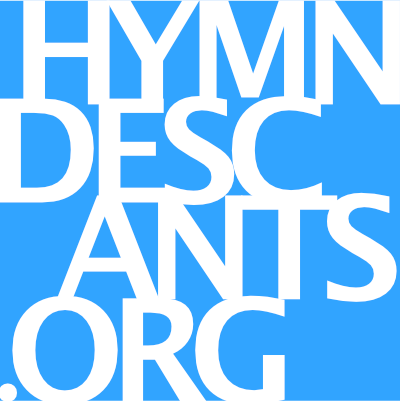AUDIO DEMO: v1 - Gerre Hancock, The Hymnal 1982| v2 - traditional | v3 - descant Free score.
1 harm. Hymnal 1982 (Gerre Hancock)
Come, thou fount of every blessing,
tune my heart to sing thy grace!
Streams of mercy never ceasing,
call for songs of loudest praise.
Teach me some melodious sonnet,
sung by flaming tongues above.
Praise the mount! Oh, fix me on it,
mount of God's unchanging love.
2. satb (unpublished study).
Here I find my greatest treasure;
hither by thy help, I've come;
and I hope, by thy good pleasure,
safely to arrive at home.
Jesus sought me when a stranger,
wandering from the fold of God;
he, to rescue me from danger,
interposed his precious blood.
3 descant
Oh, to grace how great a debtor
daily I'm constrained to be!
Let thy goodness, like a fetter,
bind my wandering heart to thee:
prone to wander, Lord, I feel it,
prone to leave the God I love;
here's my heart, oh, take and seal it,
seal it for thy courts above.
The hymn Come, thou fount of every blessing features an autobiographical disclosure: "prone to wander, Lord, I feel it," describes the broken-field early career path of Robert Robinson, a mid-18th C. preacher and hymn writer. Following a conversion experience at age 20 after a George Whitefield mission, he abandoned his apprenticeship and took up a life of sacred teaching instead. He began as a Methodist preacher, then founded an independent community, before getting repaptized and settling in as a Baptist, concluding his career with a 30-year tenure as the pastor of the Stoneyard Baptist Church in Cambridge UK. This hymn appeared as part of a collection for a church meeting in 1758, the author still in his twenties. Though originally published with more verses, the typical configuration is three. An obscure reference to 1 Samuel, "Here I raise my Ebenezer," is rendered in most printings as "Jesus sought me when a stranger," which is borrowed from one of the omitted verses. This hymn - and its associated tune, NETTLETON - forms a well-loved favorite of every denomination.
This American tune appeared as an inset with slightly phrasing as a two-part shape note arrangement named HALLELUJAH in A Repository of Sacred Music, Part Second, edited by John Wyeth. In 1830, it appeared with its current tune, aranged by Deodatus Dutton as GOOD SHEPHERD in The Christian Lyre, still in two parts. The tune was renamed for Asahel Nettleton, an evangelist of the day; the name of the composer is unknown, however there is frequent misattribution to the Repository's publisher. Come thou fount of every blessing was first paired with NETTLETON in 1852, published in Temple Melodies.
History of Hymns - C. Michael Hawn, UMC Discipleship Ministries
Glory to God: A Companion - Carl P. Daw, Westminster John Knox Press (Louisville, 2016), pp. 479-480; ISBN 978-0664503123
HALLELUJAH - Anthology of The American Hymn-Tune Repertory (website), ed. Mark Rhoads
NETTLETON - Temple Melodies, ed. Darius Jones, Mason & Law, New York, 1851
Harmonization in D
Oh, to grace how great a debtor
daily I'm constrained to be!
Let thy goodness, like a fetter,
bind my wandering heart to thee;
prone to wander, Lord, I feel it,
prone to leave the God I love;
here's my heart, oh, take and seal it,
seal it for thy courts above.
– Robert Robinson, 1758

